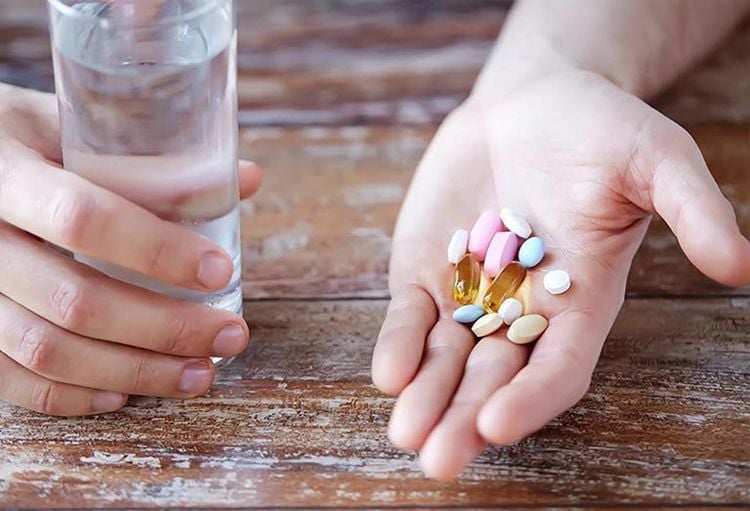This is an automatically translated article.
Aciphex (rabeprazole) is a proton pump inhibitor that reduces the amount of acid produced in the stomach. In addition, Aciphex is used briefly to treat the symptoms of gastroesophageal reflux disease in adults and children older than 1 year of age. It should be noted that Aciphex is not intended for immediate relief of heartburn symptoms. In this article, we will provide useful information for you to better understand the uses, indications and precautions when using Aciphex.
1. Aciphex
Aciphex is a brand name of Rabeprazole - a prescription medicine used to treat the symptoms of gastroesophageal reflux disease (GERD) and Zollinger-Ellison syndrome (a condition in which the stomach makes too much acid). Prevention of duodenal ulcers caused by Helicobacter pylori bacteria and intestinal ulcers. Aciphex may be used alone or with other medicines.
2. Contraindications
Do not use for patients with hypersensitivity to any ingredient of the drug. Children under 12 years of age Pregnant and lactating women should consider the benefits before use. Patients with liver disease, systemic lupus erythematosus. Osteoporosis or low bone density. Low levels of magnesium or vitamin B12 in the blood. Consider using the drug with people with liver problems: it may not be able to get rid of the drug from the body, leading to more side effects.
3. Usage
Rabeprazole is available as a 20mg slow-release capsule or tablet for safe and effective use in children under 12 years of age.Read the instructions for use and leaflet carefully before taking the medicine
Do not chew, crush or divide like a pill
3.1. Patients with Gastroesophageal Reflux Disease (GERD) Adult Dosage (age 18 years and older)
Typical Dosage: 20 mg once daily. Duration of treatment depends on your condition. Dosage will be changed if you have acid-related damage in your esophagus or if you are just treating the symptoms of heartburn caused by GERD. Pediatric Dose (ages 12-17)
Typical dosage: 20 mg once daily for up to 8 weeks. Pediatric Dose (ages 0-11 years)
No studies have shown that Aciphex is safe and effective for the treatment of gastroesophageal reflux disease (GERD) in children younger than 18 years of age.

Người bệnh nên sử dụng thuốc Aciphex đúng liều lượng
3.2. Patients with peptic ulcers Adult Dosage (18 years and older)
Typical Dosage: 20 mg once daily after breakfast for up to 4 weeks. Pediatric Dose (ages 0 - 17 years)
No studies have shown that Aciphex is safe and effective for the treatment of peptic ulcer disease in children under 18 years of age.
3.3. Patients with duodenal ulcer caused by Helicobacter pylori Dose for adults (18 years and older)
Typical dosage: 20 mg x 2 times/day with breakfast for 7 days. To treat ulcers caused by H. pylori, this medicine is used in combination with the drugs amoxicillin and clarithromycin. Pediatric Dose (ages 0-17 years)
No studies have shown that Aciphex is safe and effective for the treatment of duodenal ulcers caused by Helicobacter pylori bacteria in children under 18 years of age. 3.4. Patients with stomach conditions that produce too much acid, such as Zollinger-Ellison syndrome Adults (18 years and older)
Typical starting dose: 60 mg once daily Increase dose: Your doctor will increase your dose if necessary Maximum dose: 100 mg x 1 time / day or 60 mg x 2 times / day. Pediatric Dose (ages 0 - 17 years)
No studies have shown that Aciphex is safe and effective to treat stomach acid problems in children under 18 years of age.
4. Side effects of drugs
4.1. Common side effects Headache, nausea, vomiting Diarrhea or constipation Abdominal pain, bloating These effects are mild, and they may go away a few days or weeks after you take the medicine.

Thuốc Aciphex có thể gây triệu chứng đau đầu cho người bệnh
Convulsions Dizziness, headache Irregular or fast heartbeat Sudden pain or difficulty moving hips, wrists or back Muscle weakness Leg cramps or hands Hoarse voice, difficulty breathing, wheezing. Severe diarrhea (due to C. difficile infection), symptoms include:
Loose stools, or bloody diarrhea Abdominal pain Fever Fever cutaneous lupus erythematosus (CLE), symptoms include:
Rash on the skin and nose A red, scaly, red or purple rash on your body Systemic lupus erythematosus (SLE), symptoms include:
Fever Fatigue Weight loss Heartburn Other side effects:
Blurred vision Heavy menstrual bleeding blood or black stools Bleeding that is hard to control Gaining weight that is hard to control Muscle cramps or spasms If you have any of these serious signs or symptoms contact your doctor or get medical help right away nearest.
5. Important Warning
Severe diarrhea: Rabeprazole increases the risk of severe diarrhea. This diarrhea is caused by an intestinal infection by bacteria (Clostridium difficile). Talk to your doctor if you have watery stools, stomach pain, or a fever that doesn't go away. Fractures: If you take multiple daily doses of rabeprazole for a long time (1 year or longer), your risk of breaking a hip, wrist, or spine is increased. This medicine should be used at the lowest dose and for the shortest possible time. Low magnesium levels: Rabeprazole can cause a decrease in the amount of the mineral magnesium in your body. This usually occurs after 1 year of treatment. However, it can happen after you take rabeprazole for 3 months or longer. Low magnesium levels may not cause any symptoms, but serious side effects can occur. These include muscle spasms, irregular heartbeats, or seizures. Lupus erythematosus and systemic lupus erythematosus: Rabeprazole can cause cutaneous lupus erythematosus (CLE) and systemic lupus erythematosus (SLE). CLE and SLE are autoimmune diseases. Symptoms of CLE can range from a rash on the skin and nose, to a raised, scaly, red, or purple rash on certain parts of the body. Symptoms of SLE can include fever, fatigue, weight loss, blood clots, heartburn, and stomach pain. If you have any of these symptoms, call your doctor.
6. Drug interactions
6.1. Medicines that should not be used with Aciphex The following medicines taken with Aciphex can cause dangerous reactions in the body such as: HIV medicines such as atazanavir, nelfinavir or rilpivirine
Người bệnh không nên kết hợp thuốc Aciphex với thuốc điều trị HIV
6.2. Drug interactions increase the risk of side effects from Aciphex Taking rabeprazole with certain medicines increases the risk of side effects from these medicines, including:
Warfarin: Increased INR (blood test used to measure blood pressure) evaluate the extent of clot formation with vitamin K antagonist anticoagulants) and prothrombin time in patients receiving concomitant rabeprazole and warfarin. Bad cases can cause abnormal bleeding and death. Methotrexate: Concomitant use of rabeprazole with methotrexate (mainly at high doses) may increase and prolong serum concentrations of methotrexate and/or its metabolite hydroxy methotrexate, possibly leading to methotrexate toxicity. . Taking Rabeprazole with Acalabrutinib, Amphetamine, Atazanavir, Benzphetamine, Capecitabine, Dextroamphetamine, Digoxin, Ketoconazole, Methamphetamine, Neratinib, Octreotide, Velpatasvir, Cyclosporine... may cause the concentration of these drugs in your blood to be higher than normal. So your doctor will need to monitor the levels of these medicines in your blood when you take them together. 6.3. Drug interactions that make shared drugs less effective When taking Aciphex with the following drugs makes those drugs less effective or ineffective in treatment, including:
Antifungal drugs such as ketoconazole and itraconazole : Your doctor may recommend that you drink acidic beverages, such as cola, to help your stomach absorb these medications. Or your doctor may stop your treatment with rabeprazole while you take these medicines to make sure they are working properly. Mycophenolate mofetil: Your doctor will monitor your treatment with the medicine mycophenolate mofetil. And can adjust your dosage. Iron salts: Your doctor will likely monitor your iron levels to make sure they stay within a safe range. Cancer drugs like erlotinib, dasatinib, and nilotinib: Your doctor will likely monitor your body's response to these drugs to make sure they're working properly.
7. Preservation of drugs
Store at room temperature (from 15 - 30oC), avoid moisture and high temperature, direct light. It's better to ask your doctor or pharmacist how best to store your medicine. Keep it in a safe place, out of reach of children and pets. Do not use expired, modified or no longer need the medicine. Do not throw medicine into the toilet or flush it down the sewer line
8. Handling when forgetting medicine
If you miss a dose, take it as soon as you remember. If it is late or near time for your next dose, skip the missed dose and take it as usual. Do not double the dose as it will cause many unwanted side effects.
9. Note when taking medicine
Medicines can lower your blood levels of vitamin B12. If you are taking Aciphex long-term, talk to your doctor about vitamin B12 supplements. Get regular blood tests to avoid side effects. Not stopping the medicine suddenly will cause the amount of acid in your stomach to go unchecked leading to a worse condition. Maintain taking the medication every day at the same time. Any questions that need to be answered by a specialist doctor as well as customers wishing to be examined and treated at Vinmec International General Hospital, please contact the Website for the best service.
Please dial HOTLINE for more information or register for an appointment HERE. Download MyVinmec app to make appointments faster and to manage your bookings easily.
References: rxlist.com, drugs.com, mayoclinic.org, healthline.com






